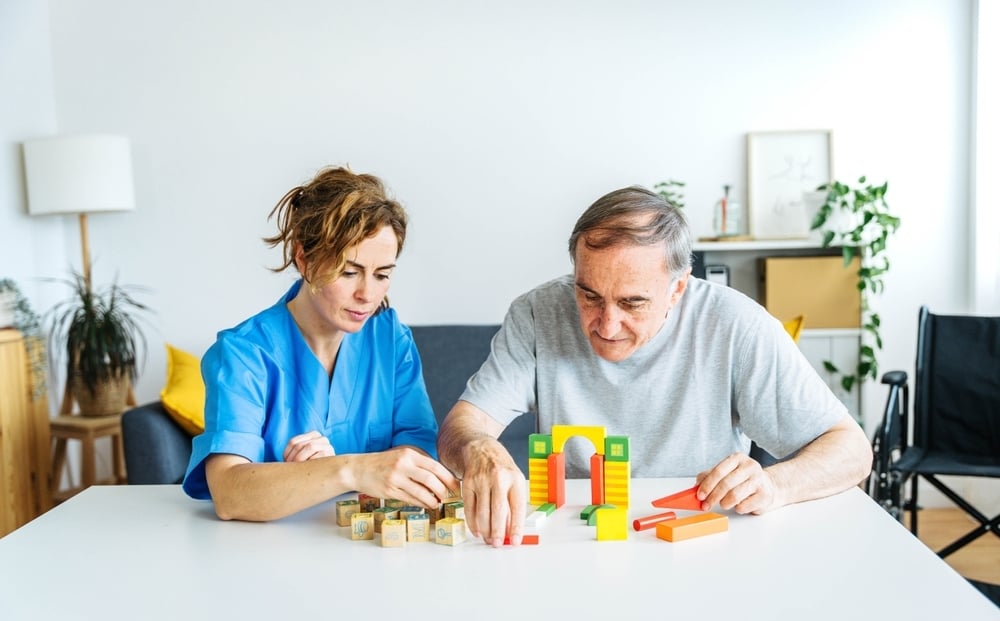Empowering older adults to talk about their mental health

The mental health of older adults is a complex challenge to understand and overcome. Mental health issues in older adults can arise for a number of reasons, but quite often, it can be because of feelings such as isolation, anxiety, and depression. Often, however, they are less able or inclined to gain access to the types of services for their mental health to which younger people are referred, such as talking therapies.
So, as we raise awareness for Time to Talk 2025, we’re discussing the challenges of mental health issues in older adults and the importance of recognising and empowering them to seek support.
Despite being just as likely to live with conditions such as depression and anxiety as younger age groups, the fact remains that only around 5% of referrals to NHS talking therapies were people over 65, according to recent data from Age UK. Studies suggest that older adults are just as likely to benefit from treatments for mental health issues as younger age groups.
Raising awareness about the importance of being more open and willing to discuss the mental health issues of older adults would benefit a sizable proportion of those over 65, as the data from Age UK below suggests:
-
Over half a million people over 65 experience anxiety
-
Just under half a million over 65s experience a major depressive disorder
-
Just under 200,00 over 65s experience chronic depressive disorder
-
Over 140,000 over 65s experience bipolar disorder
Do older people have different mental health needs?
Supporting older adults with mental health challenges starts with recognising some of the ways in which they experience mental health issues, which can sometimes differ from those of younger age groups. For example, older adults are more likely to experience a decline in mental health because of physical issues, experience the uncertainty of moving into a care home, or experience bereavement, which makes older adults up to four times more likely to experience depression than older adults who haven’t been bereaved.
Because older people are more likely to be living with multiple long-term conditions (up to 80% of people over 65 have been diagnosed with more than one long-term health condition, and many over 80 live with three or more) physical, emotional and cognitive issues can often put a strain on mental health and lead to feelings of depression, anxiety among others.

Older adults are especially at risk of mental health issues
The role of dementia in the mental health of older adults
Dementia is arguably the single biggest challenge facing the health of older adults, whether in a care setting or the community - dementia has been the leading cause of death in the UK over the last 10 years. As dementia leads to a decline in cognitive function, the condition impairs the ability to communicate with others, the ability to engage in communal activities, and the ability to retain a sense of individualism and important links to personal history.
As a result of these issues and others like them caused by dementia, it can trigger mental health problems. Estimates from Age UK suggest that 20-40% of people living with dementia also suffer from depression, and because symptoms of dementia can be similar to those of other mental health conditions, accurate diagnosis, and therefore appropriate support, is all the harder to adequately achieve. Not only this, but as older people living with dementia often struggle to express their feelings and emotions, diagnosis becomes increasingly difficult.
Why aren’t older adults getting the mental health support they need?
The perception of mental health and a lack of awareness among older adults
There has been more awareness in recent years concerning the mental health of older adults, but despite this, barriers still exist for older adults seeking mental health support. Broadly speaking, unlike younger age groups, many older people are not as inclined to proactively seek out support when they are struggling with their mental health.
Moreover, many say they would be reluctant to visit their GP if they were experiencing feelings of depression, and less than half of older adults who have experienced or are experiencing bereavement say they would be interested in counselling.

There can be less awareness about mental health among older people, which means that they do not necessarily recognise the fact that they are experiencing a mental health condition. For example, while they might recognise the fact that they are experiencing a near-constant state of low mood, they might not recognise the clinical nature of a potential depression diagnosis. And as such, they might not think to look for the support and treatment that is available to them.
Another factor for the lack of help being sought by older adults for mental health issues is the possible ingrained attitudes they might have toward mental health. Speaking to NHS England, Alistair Burns, National Clinical Director for Dementia and Older People’s Mental Health at NHS England and NHS Improvement said, “Older people sometimes feel they have to have a ‘stiff upper lip’ towards health, but we all have our own battles to fight and seeking help is a sign of strength, not weakness, so anyone out there who is feeling down and needs help, can and should get it from the NHS.
“We should remember that loneliness and isolation can be linked to physical health problems, so getting support through a talking therapist is good for mind and body.
“Depression shouldn’t be seen as a normal part of ageing and we need to challenge the assumption that older people should just put up with it, as evidence shows it can be treated.”
Potential overreliance on medication
There are also examples of older people not receiving equal access to the types of treatments for mental health issues from which they would benefit the most. For example, while younger age groups are often directed to talking therapies, it is more common for older adults to be prescribed medication by their GPs.
According to data from Age UK, older people are a fifth as likely as younger age groups to have access to talking therapies, but six times more likely to be on tranquilisers. The evidence also shows that there can be a perception that mental health conditions are an inevitable part of ageing, which is particularly true of bereavement, and it shows a belief that talking therapies are less effective for older adults, or that older adults will be reluctant to engage with the process, so opt for medications instead.

More broadly, polypharmacy, which is when people are taking multiple medications simultaneously, is a significant challenge for the wellbeing of older adults outside of considering mental health issues. While prescribing multiple medications for an older person can more often than not be a necessity due to complex health needs, the side effects of multiple medications can potentially lead to a further deterioration in the mental health of older people.
This can lead to a spiral effect, so ensuring that medications aren’t the first port of call when they don’t need to be is a crucial step in the process of improving the mental health of older adults by promoting more open discussion and giving them the support to talk about how they feel. Another way this can be done is through the greater utilisation of talking therapies.
Promoting a culture of openness and support in care settings
The mental health of older adults is linked strongly to their quality of life, as feelings of depression, anxiety, and others can often be exacerbated by social isolation, a lack of engagement in meaningful activities, and a decline in physical activity and health.
This is why, for care settings, utilising a whole home approach to providing a sense of community among residents, where their feelings and thoughts can be discussed openly, is crucial to providing support for mental health challenges. This can be achieved through greater utilisation of activities that provide meaningful engagement both individually and in the wider community of a care home, as well as utilising data that informs residents about the personalities of residents: their beliefs, preferences, likes, and dislikes. This can be achieved through utilising solutions like those provided by Person Centred Software’s Connected Care Platform.

Not just among residents in a community is this important, but staff taking the time to develop strong bonds with the residents they care for can help them to acknowledge the signs of mental health issues because, through fostering a closer relationship, they know and understand the residents as people. Conversely, this stronger bond means it's more likely for residents to feel like they can discuss their feelings more openly with staff, who can then, if necessary, refer them to clinical treatments.
Ultimately, ensuring that the mental health of older adults is acknowledged and supported, whether in a care setting or the wider community, depends on making sure that older people feel empowered to discuss their feelings openly and honestly, which is why Time to Talk is so important – for older adults or any age group.






.jpg)

.webp?width=80&height=80&name=HTD%20Awards%202023%20Badge%20(4).webp)














